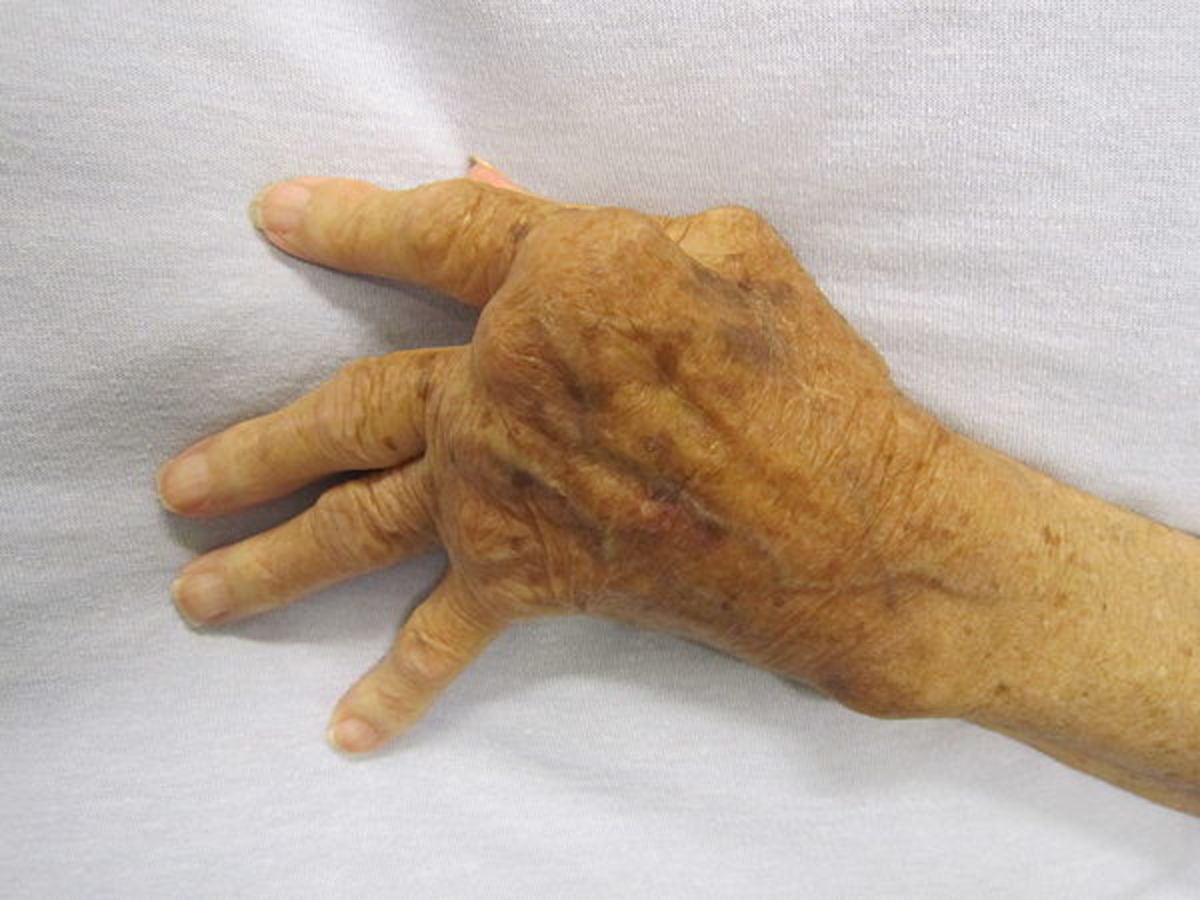Why Vitamin D Should Be Checked for Anyone with Autoimmune Condition
Some estimates are that 77 percent of Americans surveyed did not have the minimum healthful level of serum vitamin D. [reference] This percentage may even be higher in certain autoimmune diseases groups. So for people with autoimmune conditions, it would be worthwhile to have their doctors check the vitamin D levels via the Serum 25-Hydroxyvitamin D test.
Individuals can even order their own 25-hydroxyvitamin D blood test via DirectLabs.com or similar labs. They do not require any doctor's order and you can get the blood drawn as any numerous local lab facilities. There are even home self-test kits.
Autoimmune conditions may includes (but not limited to) type 1 diabetes, rheumatoid arthritis, thyroid dysfunction (either hypo or hyper thyroidism , multiple sclerosis, lupus, celiac disease, and others. You can learn more about autoimmune conditions here.
How do you know whether the vitamin D result value is low or not? The lab results will be available to you online and it will show you the reference range. Keep in mind that the serum vitamin D levels are commonly measured in two different units. It can be measured in nmol/L or in ng/mL. That is nano-mols per liter or nanogram per milli-liter. You need to know what units they are measuring.
Vitamin D Levels
According to Office of Dietary Supplements at the National Institutes of Health, what is generally considered adequate for bone and overall health in healthy individuals are greater than 50 nmol/L or greater than 20 ng/mL. But you also do not want this serum level to be too high as it may have potential adverse effects. Greater than 125 nmol/L or 50 ng/mL is specified as potentially too high.
Chris Kresser's podcast has some interesting information on vitamin D levels and why too high is also not so good. He says ...
"...study showed that the lowest mortality or risk of death from all different causes and the lowest rates of cardiovascular disease were observed at vitamin 25D levels between 20 ng/mL and 36 ng/mL."
The problem of too much vitamin D becomes more of a problem if you have low vitamin A and/or low vitamin K. Vitamin D gets calcium into the body. But without vitamin K, the calcium does not get deposited into the bone and instead gets deposited into soft tissues (which can become a problem). The podcast mentions of a study on lifeguards that had high vitamin D levels and greater incidence of kidney stones.
The vitamin D dosage need to get your serum Hydroxyvitamin D level within the reference range will depend on the individual. For some a small dose will give a large boost in serum levels. And for others, they need a large dose in order to get any rise in serum levels. So one has monitor the serum vitamin D level with the blood test.
If serum vitamin D levels are low, they need to get the levels back up. This will help with the autoimmune conditions as vitamin D is an immune modulator and plays an important role in the immune system. Although vitamin D is not the only thing that can help autoimmune conditions, it is one of many other factors to take into consideration. Healing the leaky gut is another helpful factor.
Vitamin D Deficiency and Autoimmune Diseases
There are numerous references linking vitamin D deficiency to autoimmune conditions. Here are just some ...
From the book The Inside Track, it writes ...
"Vitamin D has a profound influence on proper immune function, and sufficient levels appear to protect against autoimmunity." [page 151]
From WebMd ...
"There is now biologic evidence to back up the belief that vitamin D may protect against autoimmune diseases and certain cancers."
"Epidemiological data show significant associations of vitamin D deficiency and autoimmune diseases. Vitamin D may prevent autoimmunity by stimulating naturally occurring regulatory T cells."
Regulatory T cells are important members of the immune system. They are also known as T-regs or suppressor T cells. They modulate the immune system and maintain tolerance to self-antigens. It is when the immune system looses tolerance to self that it start attacking the body's own cells and hence the autoimmune condition.
Within PubMed, you can find many papers linking vitamin D as protective against autoimmune diseases. Here is one such paper simply titled Vitamin D and Autoimmune Disease in which it says ...
"The active form of vitamin D produces and maintains self immunologic tolerance, some studies show that 1,25(OH)2D inhibits induction of disease in autoimmune encephalomyelitis, thyroiditis, type-1 diabetes mellitus, inflammatory bowel disease (IBD), systemic lupus erythematosus, and collagen-induced arthritis and Lyme arthritis."
Vitamin D Deficiency and Celiac Disease
Those with Celiac disease may also have degraded villi in the small intestines and hence may not be able to absorb vitamin D from foods nor oral supplements. Therefore sun exposure is extra important. Dr. Vikki Petersen, author of The Gluten Effect, talks about vitamin D and Celiacs in the video on the right.
In the book Celiac Disease for Dummies, it writes ...
"Although vitamin D deficiency occurs commonly in the general population, it is particularly frequent in people with celiac disease and doctors, therefore, routinely measure their patients' vitamin D levels."
Article in VitaminDCouncil.org writes ...
"Those with Celiac disease should have vitamin D levels and bone mineral density checked. If needed, additional vitamin D can be obtained through supplements or ultraviolet-B (UVB) light exposure."
Vitamin D Deficiency and Rheumatoid Arthritis
In his article, Dr. Mercola goes as far as to say ...
"it is virtual criminal malpractice to treat a person with RA and not aggressively monitor their vitamin D levels to confirm that they are in a therapeutic range of 55-65 ng/ml." [reference]
Scientific journals seem to back up his statement.
In the Rheumatology journal, article Vitamin D and autoimmune rheumatic diseases writes ...
"Epidemiological evidence indicates a significant association between vitamin D deficiency and an increased incidence of autoimmune diseases"
It contains a chart showing the complex interaction between vitamin D and the immune system. Vitamin D plays a role in both the inhibition and enhancement action of the immune system, so that it fine-tunes the system so that it behaves appropriately. The immune system need to be able attack against foreign invaders as well as hold back against one's own cells.
The journal article further says that ...
"greater intake of vitamin D may be associated with a lower risk of RA in older women, although this finding is hypothesis-generating"
(where RA refers to Rheumatoid Arthritis)
In conclusion, the paper writes ...
"The vitamin D endocrine system is recognized as an important immune modulatory factor involved in autoimmune rheumatic diseases. ... the correction of vitamin D deficiency may be useful in the treatment of B cell-mediated autoimmune rheumatic disorders such as SLE."
(where SLE refers to Systemic Lupus Erythematosus)
If you do a web search, you will find many more similar papers. Another one found in arthritis-research.com says ...
"Epidemiological evidence indicates a significant association between vitamin D deficiency and an increased incidence of autoimmune diseases."
Vitamin D Deficiency and Thyroid Disease
The book Why Do I Still Have Thyroid Symptoms? When My Lab Tests are Normal says ...
"A vitamin D deficiency is associated with numerous autoimmune conditions, including Hashimoto's, ... Adequate vitamin D helps keep the immune balanced so it does not swing out of control into an autoimmune disease."
And on page 205, it writes ...
"Vitamin D appears to help again autoimmune-mediated thyroid dysfunction. Vitamin D appears to be helpful for autoimmune-induced diabetes."
Although these are just some examples of mentions between vitamin D deficiency an a few particular autoimmune diseases, it is likely that the same can be said of all autoimmune diseases as they all have similar pathology origin. And there are over 100 different types of autoimmune diseases.
The Best Way to Get Vitamin D is from Sun
The best way to get vitamin D3 is through sun exposure where the UVB rays hits bare skin. This triggers the skin to generate vitamin D3. This was the way nature intended us to get our vitamin D. This was mentioned by Dr. Cannell in the video above, as well as by Stephanie Seneff.
For this to work, you can not have sunscreen and you can not have glass between the sun and your skin. You also have to be out midday between 10am to 3pm such that the angle of the sun is 50 degrees or more. If the angle is not, the UVB rays would just skim and bounce off the atmosphere without reaching your skin.
Vitamin D molecule is a secosteroid molecule which is shaped like a broken ring. This is formed when UVB light breaks the steroid molecule's ring forming vitamin D.
There are some vitamin D from foods such as salmon, sardines, liver, eggs, and milk. Although milk (due to casein) is not advised for those with autoimmune conditions, and neither is gluten.
However, it is nearly impossible to get enough vitamin D from foods. Perhaps on a good balanced diet, one can get only 20% of our vitamin D requirement from foods.
For many, sun exposure and food source may still not enough. And supplementation is needed. But of course, you need to consult with your doctor and have serum levels monitored, instead of self-treat. Note that excessive vitamin D supplementation may result in high calcium levels which leads to increased risk of kidney stones. [reference] The vitamin D is to supplement any prescribed medication and not necessarily replace it.
Vitamin D3 supplements can be purchased at the supermarket (the same place you shop for your fruits and vegetables). Or you can try to find higher quality ones at your health food store. Some say that emulsified vitamin D3 is better absorbed.
Make sure they are vitamin D3 and not D2. Vitamin D3 is the natural vitamin that is found and produced in the body; whereas vitamin D2 is a synthetic form. D2 is not identical and is not found in the body. So obviously, you want the D3 form.
The skin has a self-feedback regulating mechanism, that popping vitamins does not have. The skin will tan and become less sensitive to the sun as it gets enough sun exposure.
Why vitamin D is beneficial for autoimmune conditions?
While vitamin D plays numerous roles in the human body, one of its function is that vitamin D help modulates the immune system. It fine tunes it.
Chris Kresser provides a more technical explanation in his article ...
"Vitamin D deficiency has been associated with numerous autoimmune diseases in the scientific literature. Vitamin D plays an important role in balancing the Th1 (cell-mediated) and Th2 (humoral) arms of the immune system. It does this by influencing T-regulatory (Th3) cells, which govern the expression and differentiation of Th1 and Th2 cells."
He also provides an interesting explanation of how stress can reduce vitamin D levels. Basically, the cholesterol needed to make vitamin D is diverted to making cortisol stress hormones instead.
If you have an autoimmune disease, most likely your doctor has prescribed powerful medication that suppresses the immune system. Why would that be? It is because your immune system is not functioning 100% properly. By definition, an autoimmune disease is when your immune system is attacking healthy cells of your body, unable to distinguish properly friendly cells from foreign invaders.
Type 1 diabetes is when the immune system attacks your beta cells in the pancreas. Rheumatoid arthritis is when the system attacks the joints. Celiac disease is when the immune system attacks the small intestines. And so on.
Dr. Terry Wahls, who she herself had an autoimmune disease of multiple sclerosis, writes ...
"Most doctors focus on which drug to prescribe to weaken the attacking immune cells. They rarely talk about lifestyle and behaviors as part of a treatment plan."
Fortunately she was able to recover from her autoimmune disease going from wheelchair to bicycling as described in her TEDx talk video linked here.
Vitamin D plays a role in the immune system. So if your vitamin D is low, your immune system would not be able to function optimally. In addition to the powerful medication that reduces the autoimmune symptom, it would make sense that one should also take the necessary steps to heal the body's system that is dysregulated. The two systems that are often dysregulated in autoimmune condition, is the immune system and the other is the gut.
The role that leaky gut contribute to the autoimmune condition is best explained by Dr. Vikki Petersen's video titled "Reverse Your Autoimmune Disease" The way to reverse it naturally is to heal the leaky gut.Virtually all autoimmune conditions are accompanied by the leaky gut syndrome. Dr. Thomas O'Bryan says that Vitamin D is one of the factors that can help heal a leaky gut.
In the below Hawthorn University webinar titled "Understanding Autoimmune Disease", Dr. Nikolas Hedberg mentions the importance of vitamin D in reducing the risk of autoimmunity.
Understanding Autoimmune Disease
Dr. Peter Osborne says in his video lecture linked here that vitamin D deficiency can lead to autoimmune disease.
In the book The Immune Recovery Plan, it writes that vitamin D does the following ...
- makes the immune system less reactive to self-antigens
- plays a role in making T cells into T regulator cells
- inhibits Th1 lymphocytes and keeps them in balance
- helps balance the production of antibody by activated B cells, so that they don't overproduce
It suggests that your 25-OH vitamin D levels are good if above 50 nm/l. Although some studies even say 75 nm/l.








